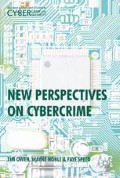Abstract
In this chapter, we examine Owen and Owen’s (2015) meta-construct of neuro-agency and developments in neuroscience concerning notions of free will, embodied cognition, neuroplasticity and neuro-ethics in relation to cybercrime. The meta-construct, neuro-agency is employed in Genetic-Social metatheoretical reasoning as an acknowledgement of the neural influence upon human free will. It is contended here that it is timely and essential to acknowledge recent developments in the neuroscience of free will and to abandon the ‘old’ term, ‘agency’. Whilst, a neural influence upon human free will is acknowledged here, it is not argued that free will is an illusion, as has been suggested by the hard-line, determinist work of Eagleman (2011). The suggestion here is that the most convincing model of free will, and the one which has played the most significant role in the development of Owen and Owen’s (ibid) notion of neuro-agency, is the ‘soft compatabilist’ model of free will offered by Dennett (1981), in which a belief in both determinism and free will is not seen as logically inconsistent. In what follows, we firstly examine selected examples from the literature on the subject of the ‘neuroscience of free will’.
Access this chapter
Tax calculation will be finalised at checkout
Purchases are for personal use only
References
Brown, S. (2013). Virtual criminology. In E. McLaughlin & E. Muncie (Eds.), The sage dictionary of criminology (3rd ed.). London: Sage.
Buckels, E., et al. (2014). Trolls just want to have fun. Personality and Individual Differences, 67(9), 97–102.
Costandi, M. (2013). Fifty ideas you really need to know: The human brain. London: Quercus.
Dennett, D. (1981). Brainstorms: Philosophical essays on mind and body. Cambridge, MA: MIT Press.
Eagleman, D. (2011). The brain on trial. The Atlantic, July/August 2011, p. 113.
Haggard, P. (2008). Human volition: Towards a neuroscience of will. Nature Reviews Neuroscience, 9(12), 934–946.
Haggard, P. (2011). Decision time for free will. Neuron, 69(3), 404–406.
Heidegger, M. (2010). Being and time. Translated by Joan Stambaugh, revised by Dennis J.Schmidt. Albany: State University of New York Press.
Libet, B. (1985). Unconscious cerebral initiative and the role of conscious will in voluntary action. The Behavioural and Brain Sciences, 8, 529–566.
Owen, T. (2009). Social theory and human biotechnology. New York: Nova Science Publishers.
Owen, T. (2014). Criminological theory: A genetic-social approach. Basingstoke: Palgrave Macmillan.
Owen, T., & Owen, J.A. (2015). Virtual criminology: Insights from genetic-social science and Heidegger. Journal of Theoretical and Philosophical Criminology, 7(1), 17–31.
Provencal, N., et al. (2013). Childhood chronic physical aggression associated with adult cytokine levels in plasma. PLoS ONE 8(7).
Sapolsky, D.M. (2011). Physiological and pathophysiological implications of social stress in mammals. Comprehensive Psychology, Wiley Online Library.
Seligman, M.E.P., et al. (2013). Navigating into the future or driven by the past. Perspectives on Psychological Science, 8(2), 119–141.
Soon, C., et al. (2008). Unconscious determinants of free decisions in the human brain. Nature Neuroscience, 11(5), 543–545.
Sparrow, B., et al. (2011). Google effects on memory: Cognitive consequences of having information at our fingertips. Science, 333, 776–778.
Wegner, D.M. (2003). The mind’s best trick: How we experience conscious will. Trends in Cognitive Sciences, 7(2), 65–69.
Wrathall, M. (2005). How to read Heidegger. London: Granta Books.
Yang, Y., et al. (2009). Localization of deformations within the amygdala in individuals with psychopathy. Archives of Psychiatry, 66(9), 986–994.
Yehuda, R., et al. (2005). Transgenerational effects of post-traumatic stress disorder in babies of mothers exposed to the World Trade Center Attacks during pregnancy. The Journal of Clinical Endocrinology and Metabolism, 90, 7.
Author information
Authors and Affiliations
Rights and permissions
Copyright information
© 2017 The Author(s)
About this chapter
Cite this chapter
Owen, T., Noble, W., Speed, F.C. (2017). Neuro-Agency, Neuro-Ethics and Cybercrime. In: New Perspectives on Cybercrime. Palgrave Studies in Cybercrime and Cybersecurity. Palgrave Macmillan, Cham. https://doi.org/10.1007/978-3-319-53856-3_2
Download citation
DOI: https://doi.org/10.1007/978-3-319-53856-3_2
Published:
Publisher Name: Palgrave Macmillan, Cham
Print ISBN: 978-3-319-53855-6
Online ISBN: 978-3-319-53856-3
eBook Packages: Law and CriminologyLaw and Criminology (R0)

